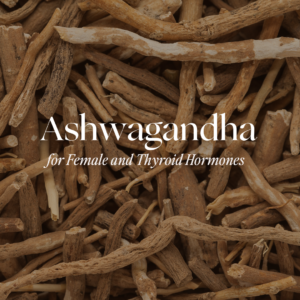Ashwagandha for Female and Thyroid Hormones
Ashwagandha is a common adaptogenic herb that has many benefits for female and thyroid hormones. Adaptogenic herbs are a class of herbs that have been shown to support the body’s response to stress and anxiety. Adaptogens work through their positive influence on stress hormone levels. Stress hormones like cortisol play a critical role in female hormone and thyroid hormone balance. When paired with the proper diet and lifestyle to support individual stress hormones, our clients have seen reported improvements to mood, cycle regularity and energy levels.

can the adaptogenic herb, ashwagandha, help in female hormones and thyroid hormone levels?
Ashwagandha’s Impact on Female and Thyroid Hormones
Progesterone
Progesterone is a hormone that is made primarily in the ovaries, specifically the corpeus luteum. Progesterone is made in the second half of the menstrual cycle, the luteal phase, in response to an increase in the hormone, luteinizing hormone. However, some women may experience an-ovulatory cycle which means ovulation does not happen. Ovulation is essential for proper progesterone production. It is estimated that up to 15% of women experience chronic anovulation. Anovulation can occur because of stress, under-eating or high testosterone levels. Progesterone has many benefits for female health outside of just fertility. It helps balance out the potentially harmful effects of estrogen, decreases premenstrual syndrome (PMS) and aids in anxiety reduction. Ashwagandha may indirectly support progesterone through its benefits on reducing stress hormones like cortisol. High cortisol levels can result in low progesterone levels in women because cortisol is made from progesterone.
Estrogen
Estrogen is another hormone made primarily by the ovaries. Smaller amounts of estrogen are also made by body fat as well as the adrenal glands (where cortisol is made). Estrogens are released by the follicles on the ovaries. Estradiol, which is the most abundant estrogen during a woman’s reproductive years, has many beneficial functions. It helps protect the bone, the heart and the brain. It is involved in serotonin production and because of this, low levels can have a dramatic influence on mood disturbances. Ashwagandha has been shown to be particularly beneficial for women in their perimenopausal years, around 40 to 50 years of age. In this population, ashwagandha supplementation has been shown to help increase estradiol levels which in turn can help reduce menopausal symptoms like hot flashes and brain fog.
Thyroid Hormones
Ashwagandha supplementation has been shown to improve the secretory function of the thyroid gland. Improving the secretory function means greater thyroid hormone level output. It does this through the HPA axis, where all hormones, including thyroid hormones originate in production. Other studies show that ashwagandha can increase T3 and T4 (thyroid hormone) levels and decrease TSH (thyroid stimulating hormone) levels, leading to improved thyroid markers. The greatest improvements were seen after four and eight weeks of supplementation.
Ashwagandha Sourcing and Safety
The sourcing of any herb is incredibly important. This study showed that 16% of herbal medicinal products had contaminant levels above regulatory limits. These contaminants include: metals, bacteria and mold. My favorite herbal medicine companies include Gaia Herbs and Mountain Rose Herbs. When utilizing ashwagandha it’s important to achieve the therapeutic dose of supplementation. This is around 600 mg total per day. Research has shown that even at the level of 50 mg/kg/day (3,409 mg for a 150 lb. individual), there were no toxic effects seen in the animal models. Although side effects to ashwagandha are rare, some individuals may not respond well to ashwagandha.
Situations Where Ashwagandha May Not Work
Ashwagandha is part of the nightshade family of vegetables that includes: peppers, tomatoes, eggplant and potatoes. Some individuals have an inflammatory response when eating nightshades. Ashwagandha is likely not safe while pregnant or breastfeeding since there are no clinical studies of safety in these populations. Ashwgandha may activate the immune system and so for some individuals with compromised immunity, ashwagandha may not be the best option. As with any supplement or herb, it’s always important to check with your healthcare practitioner as there can be medication contraindications.
How to Utilize Ashwagandha
Ashwagandha is one of our favorite adaptogenic herbs because of its extensive research on female and thyroid hormones. However, hormones can sometimes be more complex and require deeper investigation. At Functional Fueling we are committed to helping you find the underlying causes of your hormone imbalance and providing you with individualized functional nutrition solutions to support your healing. With the proper testing and treatment plan, you too can achieve hormonal vibrance.
Lauren Papanos, MS, RD, CSSD
Comments +